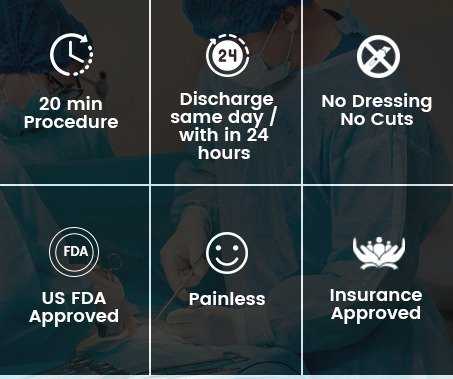Laser Piles Treatment emerges as the pinnacle choice for individuals seeking an efficient remedy for piles, boasting a host of advantages over traditional treatments.
Revered as laser hemorrhoidectomy or laser hemorrhoidoplasty, laser surgery presents a minimally invasive avenue for tackling piles. Dr. Shavez Khan, a renowned expert in Agra specializing in piles, fistula, and fissure treatment, advocates for laser surgery due to its unparalleled benefits:
- Less Pain and Enhanced Safety: Unlike conventional surgical procedures notorious for inducing significant discomfort, laser surgery offers a relatively pain-free experience.
- Expedited Procedure: Opting for laser surgery translates to a swift resolution of piles-related issues. Typically lasting around 30 minutes, the procedure’s duration hinges on factors like the number and location of piles. Patients can expect to return home shortly after without the need for prolonged hospital stays.
- Mitigated Risk of Infection: Laser energy not only facilitates the removal of piles but also serves as a sterilizing agent, thereby mitigating the risk of postoperative infections.
- Accelerated Healing: Minimal blood loss and reduced infection prospects expedite the healing process, affording patients relief at a brisk pace.
- High Success Rates: Shavez Khan attests to the efficacy of laser surgery in addressing piles. By either eliminating or shrinking piles tissues, the procedure delivers enduring relief from distressing symptoms such as pain, itching, bleeding, and discomfort.
- Diminished Postoperative Discomfort: Patients undergoing laser surgery experience minimal postoperative pain and discomfort, fostering a smoother recuperation trajectory compared to conventional open surgery methods.
- Reduced Risk of Incontinence: Laser surgery’s precision targeting of piles tissues diminishes the likelihood of inadvertent harm to surrounding anal sphincter muscles, thus mitigating the risk of postoperative incontinence—a concern prevalent in alternative surgical modalities.
- Lower Recurrence Risk: By effectively addressing underlying piles tissues, laser surgery significantly curtails the likelihood of recurrence, surpassing the efficacy of non-surgical or conservative treatment approaches.
How to Prepare for Laser Piles Treatment?
Before undergoing treatment for piles, it’s crucial to follow certain preparations and guidelines as instructed by your proctologist. These steps typically include:
If you’re scheduled for treatment by Dr. Shavez Khan, renowned for his expertise as a piles doctor in Agra, it’s important to adhere to these preparatory measures:
- Fasting: Refrain from eating or drinking anything for at least 8 to 12 hours prior to your surgery. This ensures a clean bowel and reduces the risk of anesthesia-related complications.
- Medication Adjustment: If you’re taking blood-thinning medications like warfarin, discontinue them before the surgery to minimize the risk of excessive bleeding.
- Hygiene: Maintain cleanliness of the surgical site and take a shower before hospital admission. Avoid applying lotions or perfumes.
- Shaving: It’s advisable not to shave the surgical area yourself.
- Jewelry and Accessories: Leave any jewelry or accessories at home to maintain the sterility of the operating room.
- Colon Emptying: Ensure your colon is empty before arriving at the hospital by using laxatives or enema. This helps prevent fecal matter during surgery.
- Lifestyle Adjustment: Refrain from smoking or consuming alcohol for 3-4 days before the surgery.
- Clothing: Wear comfortable clothes that are easy to remove and won’t irritate your skin.
- Transportation: Arrange for someone to drive you home or accompany you in a cab post-surgery, as anesthesia-related effects like nausea and dizziness may impair your ability to drive safely.
Side Effects Of Piles Surgery
While piles surgery is generally safe, there are potential side effects and risks associated with the procedure, including:
- Pain and Discomfort: It’s common to experience pain and discomfort in the surgical area post-surgery, varying in intensity and duration depending on the procedure.
- Bleeding: Some bleeding is expected after surgery, but excessive or persistent bleeding should be promptly reported to your healthcare provider.
- Infection: There’s a risk of infection at the surgical site, requiring proper wound care and, if necessary, antibiotic treatment.
- Urinary Issues: Temporary urinary problems such as difficulty urinating or increased frequency may occur post-surgery, usually resolving on their own.
- Fecal Incontinence: In rare cases, temporary or permanent fecal incontinence, indicating a loss of bowel control, may occur after surgery.
Advantages and Disadvantages of Piles Laser Surgery
Advantage
- Minimally invasive – Laser surgery for piles is often minimally invasive, involving smaller incisions than traditional surgery. This can lead to less post-operative pain and faster recovery.
- Reduced bleeding – The laser cauterizes blood vessels during the procedure, resulting in decreased bleeding.
- Precise targeting – Laser surgery allows precise targeting of hemorrhoidal tissue, minimizing damage to surrounding healthy tissue.
- Shorter recovery time – Patients undergoing laser surgery typically experience a shorter recovery time compared to traditional methods.
- Reduced risk of complications – The precision of laser surgery can lower the risk of complications such as infection and tissue damage.
Disadvantage
- Cost – Laser surgery for piles can be more expensive due to specialized equipment and expertise.
- Limited availability – Not all healthcare facilities offer laser surgery, limiting access for some patients.
- Chances of recurrence – Despite effectively removing hemorrhoidal tissue, there’s still a risk of recurrence over time.
- Side effects – Some patients may experience temporary pain, discomfort, or swelling after laser surgery.
Which Doctor is Best for Piles Surgery?
A proctologist or a general surgeon, like Dr. Shavez Khan, known for his expertise as a piles doctor in Agra, is considered the best for piles surgery. A proctologist specializes in the diagnosis and treatment of colorectal diseases and conditions, including those related to the colon, rectum, and anus.
Which Doctor is Best for Piles Surgery?
A proctologist or a general surgeon, like Dr. Shavez Khan, known for his expertise as a piles doctor in Agra, is considered the best for piles surgery. A proctologist specializes in the diagnosis and treatment of colorectal diseases and conditions, including those related to the colon, rectum, and anus.
What Happens During Laser Piles Treatment?
Diagnosis External piles can be diagnosed through physical inspection, while internal hemorrhoids require a digital examination by a proctologist. Instruments like a proctoscope, anoscope, or sigmoidoscope may be used for accurate diagnosis of internal piles.
Laser Surgical Treatment Laser-assisted surgery for piles stands out as one of the most effective treatment methods available. This advanced procedure utilizes a focused narrow beam of light to ablate or shrink the hemorrhoid without causing harm to surrounding tissues. As a minimally invasive approach, it facilitates a swifter recovery for patients.
What Happens During Laser Piles Treatment?
What is the Recovery Process of Piles Laser Operation?
During the recovery period following piles laser surgery, it’s essential to adhere to the following guidelines:
- Maintain Cleanliness: Ensure the surgical site remains clean to prevent infection.
- Sitz Baths: Take sitz baths regularly to promote healing and alleviate discomfort.
- Avoid Heavy Lifting: Refrain from lifting heavy weights to prevent strain on the surgical site.
- Healthy Diet: Consume nutritious, fiber-rich meals while avoiding oily and spicy foods.
- Stay Hydrated: Drink 8-10 glasses of water daily to maintain hydration.
- Gentle Bowel Movements: Avoid straining during bowel movements to prevent discomfort.
- Stool Softeners: Consider taking stool softeners if bowel movements are hard, after consulting with your doctor.
- Follow Medication Regimen: Diligently take prescribed medications and apply ointments or creams as instructed by your doctor.
In essence, the adoption of laser piles treatment under the expert guidance of Dr. Shavez Khan not only ensures comprehensive resolution of piles-related issues but also minimizes procedural discomfort and maximizes long-term outcomes.







